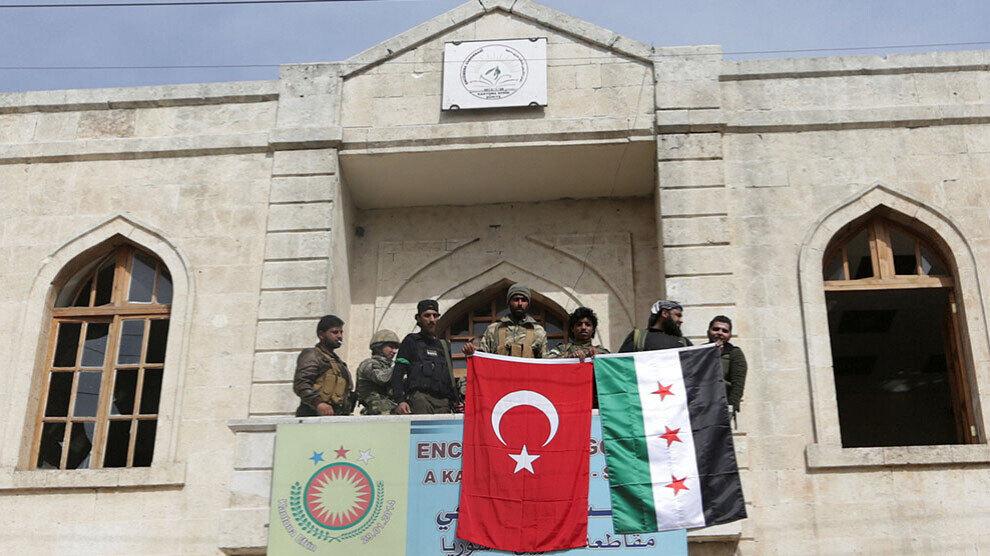The Turkish invasion of Afrin began on 20 January 2018. After about two months of resistance against the second largest NATO army, the defense units decided to withdraw in order to prevent further massacres of the civilian population. Afrin has been occupied since 18 March.
"Afrin stands for the failure of the international community to preserve human values and international law." With these words, the General Commander of the Syrian Democratic Forces (SDF), Mazlum Abdi, underlined that it has now been three years since Turkey occupied the self-governing canton of Afrin in Rojava. The international community remains silent about this breach of international law and turns a blind eye to the human rights violations that have been committed there on a daily basis for the past three years.
Under the cynical name of "Operation Olive Branch", Turkey started a war of aggression against Afrin on 20 January 2018, until the city center was finally occupied on 18 March 2018. The predominantly Kurdish populated region is one of the old populated mountain countries. The canton is enclosed by two Turkish provinces - in the north Kilis and in the west Hatay - and includes the region Çiyayê Kurmenc (Mountain of the Kurds) and contains the cities of Afrin, Shêrawa, Jindirês, Mabeta, Reco, Bilbilê, Shiyê and Shera. The name Afrin means "blessed creation" in Kurdish.
In its war of aggression, Turkey availed itself of the support of jihadist militias, which are trained, equipped and financed by the Turkish state, and used, among other things, German weapons - such as Leopard 2 tanks. These are some of the crimes committed by Turkey and its mercenaries:
- Around half a million people, including hundreds of thousands of internally displaced people, have been displaced. Most of them still live in tent cities in the neighbouring canton of Shehba
- Over 7,000 civilians were abducted; the fate of about half of them remains unknown
- Hundreds of people, including many women and children, were killed; 498 people alone lost their lives in the bombings in 2018. The killing continues to this day: the number of people killed in the torture places of the occupation troops is high and so is the number of unreported cases. Over a thousand people were injured in attacks by the occupiers
- About 65 percent of the homes of Afrin’s original population have been confiscated. Mostly Turkmen and Arab Islamist families who came from other Syrian areas such as Ghouta settled in these houses
- The nature of Afrin was also not spared from the oppression of the occupying forces. This massive environmental destruction went hand in hand with devastating economic effects on the region and its people. Since the occupation, over 315,000 trees have been cut down and sold as firewood, including 300 rare and ancient olive trees, 15,000 oaks and more than 11,000 forest trees. More than a third of 33,000 hectares of agricultural land in Afrin has been set on fire
- At least 105 archaeological sites have been looted, and the occupation forces have built military bases on some historical settlement mounds that have been levelled beforehand
- While the number of students enrolled before the invasion was 50,855, there are currently only around 13,000, but only in the Shehba region. At least 64 of the schools in Afrin were destroyed or converted in the course of the attack - including the University of Afrin. In the schools that were reopened by the occupation, Kurdish and Aramaic were removed from the curriculum - the only languages of instruction are Turkish and Arabic. In addition, the Islamic legal system (Sharia) is a compulsory subject in all institutions - this also applies to children belonging to minorities
- Christian, Yazidi, Alevi places of worship have been turned into mosques under the auspices of Turkish authorities. The names of most of the streets, squares, public and historical places in the canton have been exchanged with the names of Turkish and Islamic personalities and some have been named after those who have committed crimes against the Kurdish people
Afrin has been subjected to a long-planned process of resettlement and re-education. This state of affairs continues to this day. The silence of the international community about the invasion of Syrian territory in violation of international law, encouraged the Turkish state to go on with other aggressions against the region. With the so-called "Operation Peace Source", which began in October 2019, Turkey occupied the cities of Serêkaniyê and Girê Spî and continued its policy of displacement.














